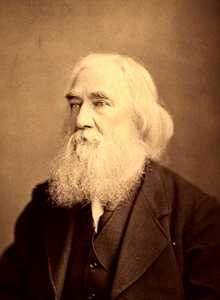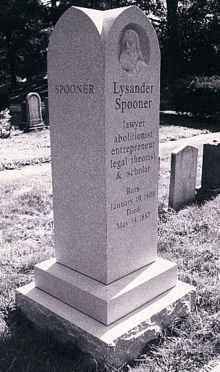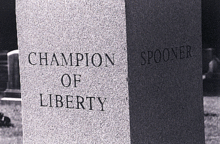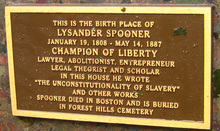In this date in 1887, Lysander Spooner, the great Nineteenth Century lawyer, abolitionist legal theorist passed away in Boston. More information about Spooner, as well as most of his publications and correspondence, can be found at LysanderSpooner.org. Here is a portion of obituaries that appeared in the Boston Daily Globe and Liberty:
Lysander Spooner: One of the Old Guard of Abolition Heroes, Dies in His Eightieth Year After a Fortnight’s Illness, Boston Daily Globe, May 18, 1887
John Boyle O’Reilly Predicts a Monument to His Memory
Yesterday Afternoon, at 12.50 o’clock, one of the most remarkable men who has ever walked the street of Boston departed this life at his residence, 109 Myrtle street. His name, Lysander Spooner, is known to but a few — to fewer perhaps than 30 years ago — but, as John Boyle O’Reilly says, it will some day be honored by millions. The illness which was the immediate cause of his death began about three weeks ago, but did not confine him to his house and bed until a week later. Since then he had been gradually sinking under the combined influence of rheumatism and bilious fever. He would not consent to the calling of a doctor until a few days ago, having bitter antipathy to the medical profession of whatever school, and feeling that he knew his own constitution better than any on could know it for him, and finally when on was summoned he would not take his medicines. However, it made no difference, as the doctor said there was no hope of his recovery. Being of a very sanguine temperament, he would not believe that his illness was fatal until Thursday last. Friday he lapsed into a comatose condition, and from Friday evening till Saturday noon, when he died without a struggle, he was entirely unconscious. . . .
Though Mr. Spooner did not call himself an Anarchist, his political and financial views coincided more nearly with those of the Individualistic Anarchists than with those of any other school.
Mr. Spooner left many manuscripts, and was engaged until his last sickness in daily labor upon his writings, which was performed cheerfully in the Athenaeum Library.
Upon almost every subject, this large-hearted man was at adds with his day and generation. He was intensely in earnest and far in advance of the average sentiment. While he was possessed of many lovable qualities, his personality was so pronounced and his convictions of duty so strong that he had few lasting affiliations with friends. But such as he had were of the strongest. Like John the Baptist, he performed his chosen mission alone and by his own peculiar methods accomplished his work and liver to rejoice with the friends of freedom over the total abolition of the accursed and hated system of human slavery. His contemporaries one and all bear glad testimony to his uncompromising honesty and integrity of purpose and to the transcendent nobility of his manhood. After a stormy and troubled life, a life full of sacrifices and bitter strifes he sleeps his last sleep. He has gone, and there is one less of that rapidly-dwindling number of heroes who counted their lives and their fortunes as nothing in the scale against the rights of their weak and oppressed brethren. Deceased leaves no family, never having been married.
His funeral will be held at his late residence, 109 Myrtle street, at 2.30 o’clock, and among the several addresses will be one by John Boyle O’Reilly.
That gentleman, in commenting yesterday on the character of the deceased, said he was one of the greatest men the world ever saw. A man whose nature was so large and his love for humanity so great that he distinguished no race or creed or nationality. In his own way, in his humble living, as an anchorite, he made his beneficence felt to every hand. Still, with all his power to do good to his fellow men, but few had ever heard of him, and fewer still were privileged with his acquaintance. His loss to the country was the greatest since the death of Emerson.
He was even a greater man than Emerson, and Mr. O’Reilly prophesied that a monument would be erected to perpetuate his memory in 20 years, or 50 years at the farthest.
Benjamin R. Tucker, Our Nestor Taken From Us, Liberty, May 28, 1887
On almost any day except Sunday, for as many years as the present writer can remember, a visitor to Boston’s Athenaeum Library between the hours of nine and three might have noticed, as nearly all did notice, in one of the alcoves overlooking Tremont Street across the Old Granary burying ground, the stooping figure of an aged man, bending over a desk piled high with dusty volumes of history, jurisprudence, political science, and constitutional law, and busily absorbed in studying and writing. Had the old man chanced to raise his head for a moment, the visitor would have seen, framed in long and snowy hair and beard, one of the finest, kindliest, sweetest, strongest, grandest faces that ever gladdened the eyes of man. But, however impressed by the sight, few realized that they had been privileged with a glimpse of one whose towering strength of intellect, whose sincerity and singleness of purpose, and whose frank and loving heart would endear him to generations to come; still fewer suspected that each sentence flowing gently from the quill in those slowly stiffening fingers was powerfully contributory to the resistless sweep of a flood of logic and of scornful wrath destined to engulf the ill-founded structure of a false society. Such, nevertheless, was the truth. But he will add no more to its might. For the past month, his familiar form has been missing from its accustomed place, and the habitues of the Library will never see him there again. For he is dead. His name was Lysander Spooner, a name henceforth memorable among men.
He died at one o’clock in the afternoon of Saturday, May 14, in his little room at 109 Myrtle Street, surrounded by trunks and chests bursting with the books, manuscripts, and pamphlets which he had gathered about him in his active pamphleteer’s warfare over half a century long. For a year or more he had been visibly declining physically and had been unable to move about without the aid of a crutch, and on the second day of the present month he sank into a bilious fever from which he never recovered. Almost bitterly hostile to all schools of medicine and confident in his knowledge of his own constitution, he refused to suffer a doctor’s presence until three days before his death, and even then, with a firmness always characteristic of his life, he declined to describe his symptoms or to accept either advice or medicine. Nor would he pay heed to the solicitations of those who, assured that his recovery was hopeless, besought him to make some disposition of his precious manuscripts. “Oh! I shall get up to attend to that,” he would answer in his weak but ever cheerful voice. He gradually lapsed into an unconscious state, which lasted some twenty-four hours, and then he died without a struggle. Some time or other the story of this glorious life of eighty years will be told in detail as it deserves. Here neither time, space, nor material permit me more than a hasty glance at certain phases of it.
It began on a farm in Athol, Massachusetts, on January 19, 1808, and on this farm, belonging to his father, young Spooner spent his boyhood and a few years of his manhood. At the age of twenty-five, equipped with such learning as a country-school education then afforded, he went to Worcester, where he obtained a clerkship in the Registry of Deeds. His year’s experience in that office, coupled with his painstaking and methodical nature, made him a very reliable conveyancer and examiner of titles, in which capacity, however, he seldom had occasion to act in after life. On throwing up his clerkship, he began to read law in the office of John Davis, a celebrated member of the Worcester bar, and later studied in the office of Charles Allen, who is counted among the foremost of Massachusetts lawyers. Probably these men of talent little imagined what a giant intellect was developing under their eyes. Indeed, it is more than likely that their hopes were slight regarding the future of a young man to whom already the details and formalities and absurdities and quackeries of statute law seemed but so much cobweb which he must brush away in order to obtain a closer view of those fundamental veracities and realities which he called the principles of natural justice, whose mind had begun to soar from the realms of pettifoggery into those of high philosophy, and who, instead of perfecting himself in the art of bleeding a client, was devoting himself to writing his first pamphlet, entitled, “A Deist’s Reply to the Alleged Supernatural Evidences of Christianity.”
Among the evils from which the country then suffered, even to a greater extent than at present, was the government monopoly of the postal business and the consequent enormous rates of postage. In opposition to this outrageous violation of liberty Mr. Spooner took his first step in economic reform. He saw that the evil could be remedied by competition, and he tried to convince the people that the government had no right to monopolize the carriage of mail matter. But his arguments had no effect. So, remembering his success in defying the law when seeking admission to the bar, he determined to defy it again. Accordingly, in 1844, he started a private mail between Boston and New York, and soon extended it to Philadelphia and Baltimore, charging but five cents a letter between any of these points, — a very much smaller sum than the government was then charging. The business was an immediate success and rapidly extending. But as the carrying of each letter constituted a separate offence, the government was able to shower prosecutions on him and crush him out in a few months by loading him with legal expenses. His aim was to get one case before the Supreme Court, but the officials were too shrewd to let him do that. Others, who had followed his example, were treated likewise. Nevertheless the matter had created such a stir, and Mr. Spooner had obtained so many acknowledgments from congressmen of the superiority of his system, that the following year public sentiment compelled a large reduction in the government rates of postage. That Mr. Spooner by his bold course conferred an immense benefit upon mankind no one can gainsay, and he certainly deserves the title of “father of cheap postage in America.” But this was not the victory that he aimed at; this was not the victory that still remains to be won. What Mr. Spooner struck at was the monopoly, and that stands to this day, more firmly rooted than ever, and fostering a multitude of evils which competition would remedy at once. The people have been dissuaded from demanding its abolition by the successive reductions that have been thrown at them as sops. When one of the daily papers proposed, therefore, a few days ago, — meaning well, no doubt, — that Mr. Spooner’s head be put upon the next new postage stamp, in effect it insulted Mr. Spooner. He maintained to the day of his death — and the most experienced expressmen agree with him — that there is profit in carrying letters all over the United States at one cent each, and that the government monopoly of the business alone prevents the people from enjoying such a boon. If anything, then, could make him turn in his grave, it would be the consciousness of the fact that his likeness was being used in a way to jointly glorify himself and the monopoly which he worked so hard to destroy.
Mr. Spooner owes his chief reputation as a publicist to a pamphlet which, despite its great ability, is not by any means his most important work. “The Unconstitutionality of Slavery” at once made him prominent in the abolition conflict, and for some years his fame was considerable. Garrison and his followers had been conducting their agitation on the theory that the Constitution was a pro-slavery document and should be trampled under foot. When Spooner came forward, therefore, with a wonderfully strong legal argument to show that slavery was unconstitutional, it naturally excited much attention. Those who were in favor of abolishing slavery by political methods – among them Gerrit Smith and Elizur Wright – strongly endorsed the doctrine, and the book became the textbook of the Liberty Party. Wendell Phillips did his best to answer it, but as a logician Phillips was to Spooner as a pygmy to a giant. The battle raged fiercely until events forced the anti-slavery struggle to turn upon another issue, and the palm of victory has never been awarded. It should be borne in mind that the question was one of interpretation simply; the authority of the Constitution as such was not under discussion; if it had been, Spooner’s opposition to it would have been far more radical than Garrison’s. Besides this pamphlet Mr. Spooner wrote two others in connection with the anti-slavery conflict, – “A Defence of Fugitive Slaves” and an “Address to the Free Constitutionalists.”
Mr. Spooner was a staunch advocate of the jury system as the best method of administering justice, – not the jury system of today, but that originally secured by Magna Carta. On this subject he wrote an exhaustive legal work entitled “Trial By Jury,” in which he maintained that no man should be punished for an offence unless by the unanimous verdict and sentence of twelve men chosen by lot from the whole body of citizens to judge not only the facts but the law, the justice of the law, and the extent of the penalty, and that the gradual encroachment of judges upon the rights of juries had rendered the latter practically worthless in the machinery of justice. Much that he advocated in this volume has already prevailed in Illinois and some other States. The Book closes with a denial of the right of compulsory taxation.
 I am at the end of my space, and have not said half that I had in mind. It would be easy to fill this number of Liberty with gossip and reminiscence concerning this delightful character, with eulogy of his surpassing powers and virtues, with criticism of his limitations. But I must not do it, I need not do it. Does not his work speak for him as I cannot? It is ours, my readers, to continue that work as he began it. And we shall not have rendered him his full reward of praise unless it shall be said of us, when we in turn lay down our arms and lives, that we fought as good a fight as he and kept the faith as he did.
I am at the end of my space, and have not said half that I had in mind. It would be easy to fill this number of Liberty with gossip and reminiscence concerning this delightful character, with eulogy of his surpassing powers and virtues, with criticism of his limitations. But I must not do it, I need not do it. Does not his work speak for him as I cannot? It is ours, my readers, to continue that work as he began it. And we shall not have rendered him his full reward of praise unless it shall be said of us, when we in turn lay down our arms and lives, that we fought as good a fight as he and kept the faith as he did.
Let this poor tribute end, then, here. On Sunday next, May 29, at half past two o’clock, in Wells Memorial Hall, 987 Washington Street, Boston, worthier words will be spoken in honor of the dead philosopher at a special memorial service, in which Theodore D. Weld, Henry Appleton, J.M.L. Babcock, Thomas Drew and E.B. McKenzie will take part, thus supplementing the funeral service of Tuesday, May 17, — the day of the burial at Forest Hills, — when addresses were delivered by Mr. Babcock, Parker Pillsbury, and M.J. Savage.
Comments are closed.